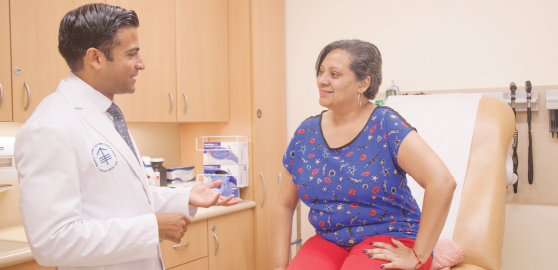Obesity is a leading cause of cancer, and researchers are working to learn more about the biology behind the body’s metabolism and the promotion of cancer growth.
“While we know that physical activity and a balanced diet are generally healthy, we don’t yet have the data to make personalized recommendations that guide people on what they should be doing specifically with their diet or exercise programs in relation to cancer prevention or treatment,” said Neil Iyengar, MD.
With funding from Conquer Cancer®, the ASCO Foundation, Dr. Iyengar is leading discoveries in how metabolic health impacts cancer risk and treatments in breast cancer.
“My Young Investigator Award gave me the resources to understand why body fat and poor metabolic health cause cancer to grow,” explained Dr. Iyengar. “My second grant, the Career Development Award, allowed me to take the next step and develop clinical tests to measure a person’s metabolic health as it relates to cancer. This helps us learn more about why a tumor may grow in a body that appears healthy but may have hidden metabolic dysfunction.”

Dr. Iyengar meets with a patient at Memorial Sloan Kettering Cancer Center, where he researches metabolic health in relation to breast cancer and serves as an Assistant Attending in the Breast Medicine Service.
Promising results from Dr. Iyengar’s initial research helped launch four additional trials, including a clinical trial of precision exercise to improve treatment response in individuals with metastatic breast cancer. His current work, which uses “tele-exercise” for supervised, home-based exercise sessions, is endorsed by the National Institutes of Health and funded by a National Cancer Institute R01 grant.
In a related trial, Dr. Iyengar’s team is testing a combination diet and exercise intervention in patients with early-stage breast cancer. “We will randomly assign participants to two different types of intervention. For one group, we will provide a supervised, individualized, prescription exercise program and delivery of plant-based meals,” said Dr. Iyengar. “The other arm will include visits with exercise physiologists and nutritionists for lifestyle counseling.”
Because there is little science in lifestyle intervention, Dr. Iyengar’s findings will provide real-world data poised to create a new standard of care and support his goal of comprehensive, individualized plans that optimize lifestyle and wellness for preventing cancer and cancer recurrence.
“In addition to preventing cancer recurrence, we are finding that these interventions are beneficial to a patient’s recovery after cancer treatment,” he explained. “That is the benefit of clinical research—we set out to study one question and uncover ways to help patients beyond what our initial hypothesis may suggest.” ■
© 2020. American Society of Clinical Oncology. All rights reserved.

